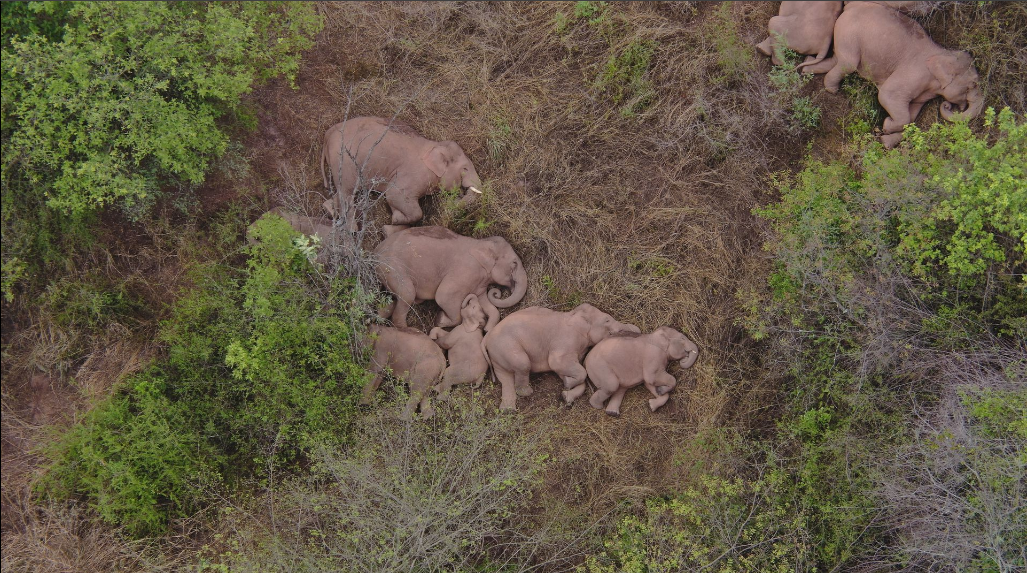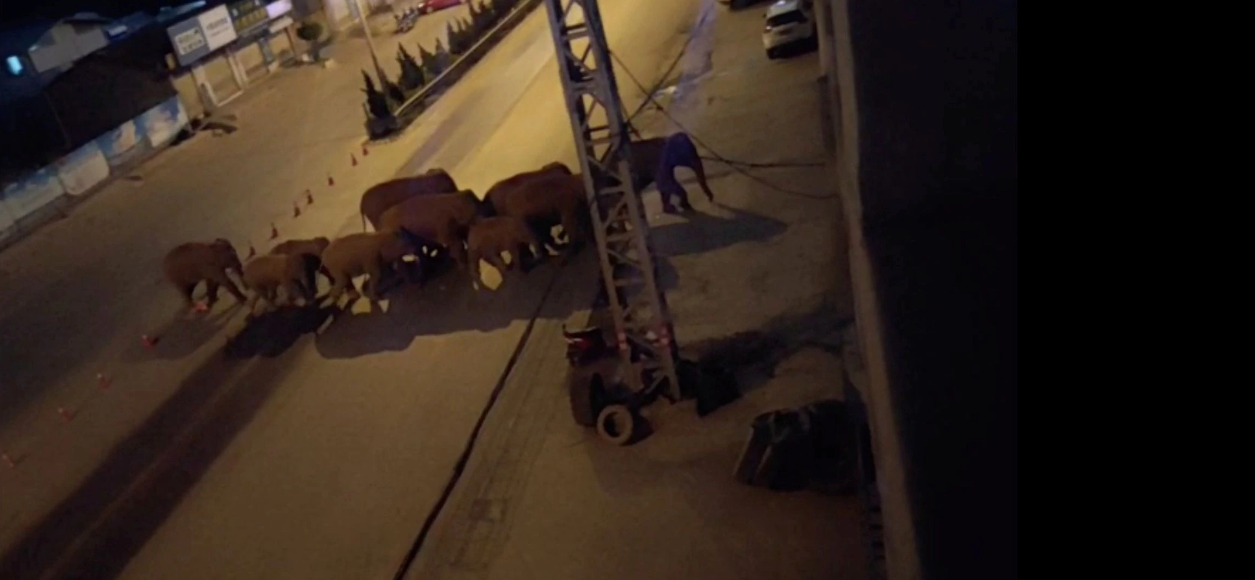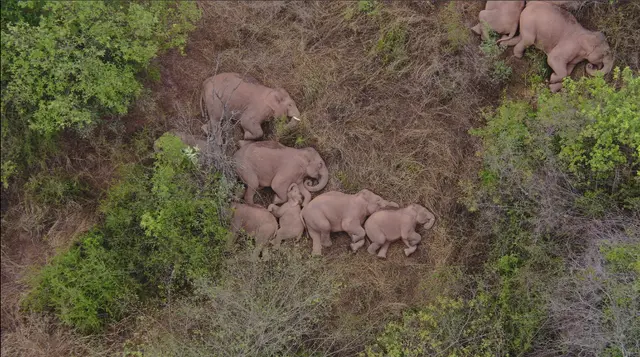
As mystery shrouds a herd of elephants continuing their unusual journey in the southwest Chinese province of Yunnan, deviating from the traditional migration route, wildlife conservationists feel a range of unresolved issues could have forced the tuskers to leave their core habitat.
The group left the Xishuangbanna National Nature Reserve in March. It has traveled more than 500 kilometers north of the province to reach Kunming City, devastating paddy fields and a range of facilities on its jumbo journey, causing damage worth more than $1 million.
They are still marching ahead, forcing authorities to deploy drones and personnel to ensure the residents' safety.
"Asian elephants are loyal to their home range. Based on research, the only reason a herd with females and calves would move away from the home range is because of something may have happened in their habitat," said Nilanga Jayasinghe, a wildlife conservation manager at World Wildlife Fund (WWF).
Too many elephants in limited space
Over the years, massive infrastructure projects, changes in agricultural practices and five fragmented sub reserves of Mengyang, Mangao, Menglun, Shangyong and Mengla have started taking a toll on the rising elephant population inside Xishuangbanna.
The trouble started brewing when the protection level of elephants was raised in 1988. Their population has nearly doubled from 170 at the time to 300 individuals today. Their habitat, however, remains fragmented.
According to a
study
published this week, a team of Chinese researchers proposed a slew of actions, including connecting unprotected areas for elephants, Liushun and Simaogang, with Mengyang, a protected elephant area. They also proposed connecting two elephant-protected areas of Mengla and Shangyong.
"The elephant range is currently expanding; the rapid development of southern Yunnan poses the question of whether elephants can continue to coexist with people in the future," the study warned.
Cramped inside limited and disconnected forests, elephants frequently venture out from the forest to raid the human settlements, leading to conflicts in the region. The study suggests installing early warning systems and, most importantly, constructing corridors to connect the fragmented reserves to mitigate the conflict.
The situation is not just limited to China. Elephant habitat has plummeted globally. It has declined by over 50 percent for African elephants, and Asian elephants are restricted to 15 percent of their original range, exacerbating human-elephant conflict.
How protected are elephants inside forest reserves?
There is no doubt that the conservation efforts have doubled the number of elephants in Yunnan. Still, human-animal conflict continues to intensify, not only in China but also in India, Sri Lanka and other countries, Becky Shu Chen, a consultant for the Zoological Society of London (ZSL), told CGTN.
"One of the major causes behind these elephants leaving their core habitat is the question of how are we developing our forests. Protected forest reserves are designed to protect the forest and the biodiversity, but not designed for the elephants," said Chen.
A forest reserve increases tree cover for various species, restricts human activities and help curb poaching. However, elephants prefer a mix of grassland and thick forest cover and live within two kilometers of humans, Chen said.

A herd of elephants walks along a road in Eshan, Yunan, China on May 27, 2021, in this still image taken from video obtained from social media. /Reuters
Over the years, shrinking habitat and the lure of food like paddy, sugarcane and fruits, cultivated in the farmland near forests have enticed elephants to live closer to human settlements. But with agriculture in most parts of Yunnan switching to cash crops like rubber, foraging has left these pachyderms baffled.
A similar behavior change, like the one happening in Yunnan, was reported among a herd of elephants in Assam in 2019, where instead of keeping out elephants from outside herds, the group welcomed them to join. Ultimately, their size increased to more than 125 individuals. The phenomenon still baffles wildlife experts.
According to theInternational Fund for Animal Welfare(IFAW), elephants in Yunnan generally migrate within a 100-kilometer range. They have also moved between their original habitat and a new region for a while. It also happened before that a herd eventually decided to reside in a new habitat.
The elephant in the room: animal-human conflict
"However, the recent northbound movement to such a far distance is really unusual. It may be possible that inexperienced leadership of the elephant in charge of the migration might have led the family astray ," said YK Ma, a senior program officer IFAW.
Ironically, with the herd raiding various parts of Kunming, which will also host the Global Biodiversity Summit (COP-15) later this year, the phenomenon could motivate parties attending the UN Convention on Biodiversity (CBD) to revisit the issue of the human-animal conflict raging across the globe.
"This conflict is not only about elephants but is happening everywhere in the world, including urban areas. So far, the CBD has not raised the issue at a scale that it should have been," Nilanga from WWF said, adding that the organization has acted to ensure that the issue is dealt with strongly.
'Not easy to translocate marching elephants'
While the marching elephants in Yunnan have raised debate about global conservation policies, uncertainty hovers on how to return the herd to their original habitat.
One possible solution could be to lure them with food of their choice to take the route back to the nature reserve, Chen suggested. But many believe the task won't be that easy to execute. It would be almost impossible to translocate the herd, comprising six adult cows, two adult bulls, three sub-adults, and three calves back to the reserve, IFAW said.
"It is extremely challenging to tranquilize and translocate such a big herd of elephants together, especially when there is a calf in the herd, making them more alert and agitated," said Ma.
(Cover: Wild Asian elephants lie on the ground and rest in Kunming's Jinning District, Yunnan Province, China, June 7, 2021. /Reuters)
 简体中文
简体中文



